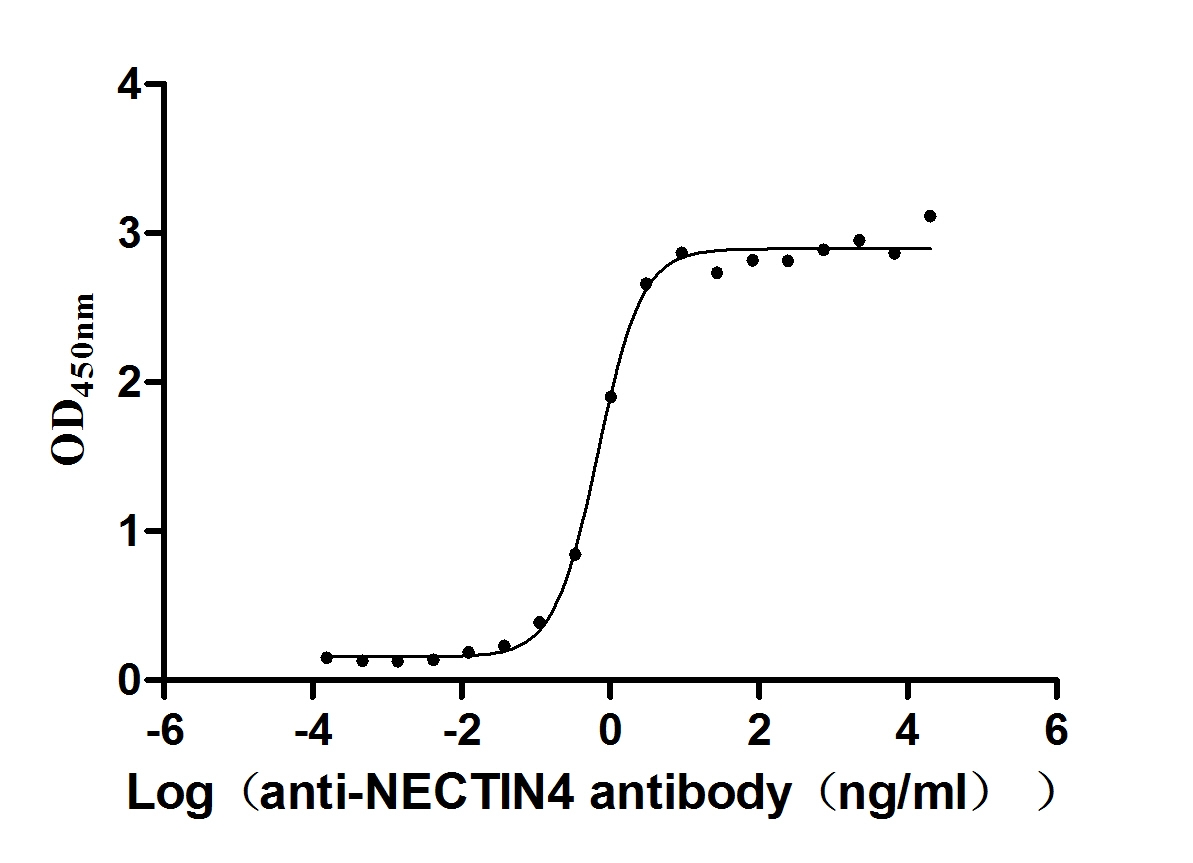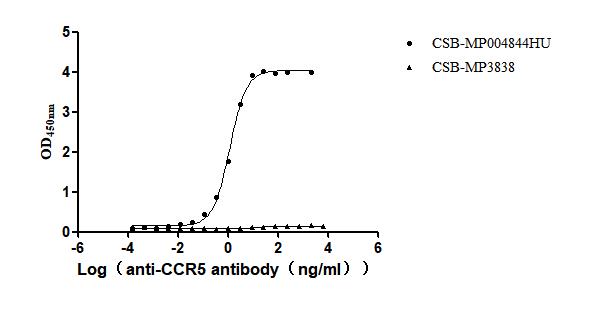Recombinant Mouse T-lymphocyte activation antigen CD86 (Cd86)
-
货号:CSB-CF004965MO
-
规格:
-
来源:in vitro E.coli expression system
-
其他:
产品详情
-
基因名:
-
Uniprot No.:
-
别名:Cd86; T-lymphocyte activation antigen CD86; Activation B7-2 antigen; Early T-cell costimulatory molecule 1; ETC-1; CD antigen CD86
-
种属:Mus musculus (Mouse)
-
蛋白长度:Full Length of Mature Protein
-
表达区域:24-309
-
氨基酸序列VSVETQAYFNGTAYLPCPFTKAQNISLSELVVFWQDQQKLVLYEHYLGTEKLDSVNAKYLGRTSFDRNNWTLRLHNVQIKDMGSYDCFIQKKPPTGSIILQQTLTELSVIANFSEPEIKLAQNVTGNSGINLTCTSKQGHPKPKKMYFLITNSTNEYGDNMQISQDNVTELFSISNSLSLSFPDGVWHMTVVCVLETESMKISSKPLNFTQEFPSPQTYWKEITASVTVALLLVMLLIIVCHKKPNQPSRPSNTASKLERDSNADRETINLKELEPQIASAKPNAE
Note: The complete sequence including tag sequence, target protein sequence and linker sequence could be provided upon request. -
蛋白标签:N-terminal 10xHis-tagged
-
产品提供形式:Liquid or Lyophilized powder
Note: We will preferentially ship the format that we have in stock, however, if you have any special requirement for the format, please remark your requirement when placing the order, we will prepare according to your demand. -
缓冲液:Lyophilized from Tris/PBS-based buffer, 6% Trehalose, pH 8.0
-
储存条件:Store at -20°C/-80°C upon receipt, aliquoting is necessary for mutiple use. Avoid repeated freeze-thaw cycles.
-
保质期:The shelf life is related to many factors, storage state, buffer ingredients, storage temperature and the stability of the protein itself.
Generally, the shelf life of liquid form is 6 months at -20°C/-80°C. The shelf life of lyophilized form is 12 months at -20°C/-80°C. -
货期:Basically, we can dispatch the products out in 1-3 working days after receiving your orders. Delivery time may differ from different purchasing way or location, please kindly consult your local distributors for specific delivery time.Note: All of our proteins are default shipped with normal blue ice packs, if you request to ship with dry ice, please communicate with us in advance and extra fees will be charged.
-
注意事项:Repeated freezing and thawing is not recommended. Store working aliquots at 4°C for up to one week.
-
Datasheet & COA:Please contact us to get it.
相关产品
靶点详情
-
功能:Receptor involved in the costimulatory signal essential for T-lymphocyte proliferation and interleukin-2 production, by binding CD28 or CTLA-4. May play a critical role in the early events of T-cell activation and costimulation of naive T-cells, such as deciding between immunity and anergy that is made by T-cells within 24 hours after activation. Also involved in the regulation of B cells function, plays a role in regulating the level of IgG(1) produced. Upon CD40 engagement, activates NF-kappa-B signaling pathway via phospholipase C and protein kinase C activation.
-
基因功能参考文献:
- Our results reveal a role for B7-2 as obligatory receptor for superantigens. B7-2 homodimer interface mimotopes prevent superantigen lethality by blocking the superantigen-host costimulatory receptor interaction. PMID: 27708164
- results suggest that the TLR2-p38-CD86 signaling pathway plays a vital role in inflammation associated with burn injury PMID: 28460187
- role with CD40 in primary germinal center generation of distinct antigen-presenting cells PMID: 28768709
- B7.2 expressed on skin CD8(+) T cells supports the survival of Tregs, likely through interaction with its receptor CTLA-4, which is highly expressed on skin Tregs. PMID: 27183612
- Low CD86 expression is associated with B16 melanoma. PMID: 26485753
- Local administration of CD86 siRNA during the effector phase ameliorates asthma phenotypes. PMID: 25344652
- Meningococcal capsular polysaccharide-loaded vaccine nanoparticles induce expression of CD86. PMID: 24981893
- novel function of CTLA4Ig in tumor immunity and suggest that CD86 on NK cells is an activating receptor and closely involved in the CTLA4Ig-mediated anti-tumor response. PMID: 24349559
- CD4(+) NKG2D(+) T cells induce NKG2D down-regulation in natural killer cells in CD86-RAE-1epsilon transgenic mice. PMID: 24708417
- CD86 expression has functional consequences for the magnitude of CD4 T cell responses both in vitro and in vivo. These data pinpoint CD86 upregulation as an additional mechanism by which IL-21 can elicit immunomodulatory effects. PMID: 24470500
- the results presented here demonstrate that recruitment and expression of MHC-II, CD80, CD86, PDL1, and PD-L2 in M of peritoneal cavity in T. crassiceps early at infection is associated to the sex of the host. PMID: 23533995
- Combinatorial signaling through TLR-2 and CD86 augments B-cell receptor-free activation and differentiation of resting B cells. PMID: 23365665
- Phb1/2 and the CD86 cytoplasmic domain cooperate to mediate CD86 signaling in a B cell through differential phosphorylation of distal signaling intermediates required to increase IgG1. PMID: 23241883
- In response to Pseudomonas infection, mobilized neutrophils upregulate and provide B7 trans-costimulatory signals to T cells, preventing established lung allograft tolerance. PMID: 23018463
- Data indicate that most toll-like receptor (TLR) ligands induced comparable upregulation of co-stimulatory molecules CD40, CD86 and B7H1 on young and aged conventional dendritic cells (cDC). PMID: 22231652
- Interaction between CD28 and B7 molecules is required for regulation of splenic and bone marrow plasma cells. PMID: 22908331
- B7 and CD28 interactions promote the proliferation and survival of murine gammadelta T cells following Plasmodium infection. PMID: 22732586
- Yeast-derived beta-glucan lacks cytotoxic effects towards B-lymphoma cells but up-regulation of CD86 suggests maturation of the cells via dectin-1 by the carbohydrate PMID: 22199280
- Ubiquitin-mediated regulation of CD86 protein expression by the ubiquitin ligase membrane-associated RING-CH-1 (MARCH1). PMID: 21896490
- Parasite-induced B7-2 is dependent on Jun N-terminal protein kinase (JNK) but not extracellular signal-regulated kinase or p38 signaling; its expression on human peripheral blood monocytes is dependent on JNK signaling. PMID: 21911468
- These studies suggest that ubiquitination serves as an important mechanism by which dendritic cells control CD86 expression PMID: 21849678
- T-cell costimulation via B7 ligands (CD80 and CD86) is essential for development of experimental hypertension; inhibition of this process could have therapeutic benefit in the treatment of this disease. PMID: 21126972
- CD86 is critical for naive CD4+ T cell activation in vivo and differentiation into either a Th1 or Th2 phenotype. PMID: 11937530
- B7-2 in deleting pathogenic autoreactive T cells in the thymus. PMID: 11956287
- B cell-associated B7-2 expression is regulated by stimulation of the B cell receptor and/or the beta 2-adrenergic receptor in vivo and in vitro. PMID: 12055247
- Activation-induced up-regulation of B7-2 on antigen presenting cells leads to increased CD28 signaling and a commitment to cross-priming of CD4-dependent cytotoxic T lymphocytes. PMID: 12370335
- Role of CD86 in enhancing cell-cycle progression and survival of CD4(+) T lymphocytes after activation. PMID: 12429713
- fate of LACK-specific CD4+ T cells in Leishmania-infected BALB/c mice which have been treated or not with anti-CD86 mAb PMID: 12516542
- Although CD86 plays a critical role in T-dependent IgG and IgE responses of B cells to in vivo antigenic challenge, direct CD86 signaling of a B cell is not essential for its efficient activation. PMID: 12517941
- Stimulation by CD86, either alone or together with beta 2-AR on a CD40ligand/IL-4 activated B cell, increases both the level and the rate of mature IgG1 transcription without affecting transcript stability or class switching to IgG1. PMID: 12734361
- B7-2 and B7-1 have overlapping functions in the endogenous superantigen-mediated deletion of TCR V beta 11- or V beta 12-bearing thymocytes. PMID: 12759417
- B7-2 overexpressed on transgenic donor T cells mediates reduced alloresponsiveness and mortality in graft-vs-host disease compared with wild-type T cells. PMID: 14688306
- stimulation of matured bone marrow dendritic cells with anti-CD80 monoclonal antibody up-regulated CD86 levels on the cell surface Coculture of these cells with naive, allogeneic T cells downregulated Th1 responses and upregulated suppressor responses PMID: 14966193
- T cells activated in the presence of parenchymal cells from the eye express B7-2 in a manner that equips them to suppress bystander T cells. Thus, B7-2 expression on T cells participates in their eventual ability to function as regulators in vitro. PMID: 15034031
- increased surface expression on Mycobacterium tuberculosis secretory antigen (MTSA)activated dendritic cells after stimulation with M. tuberculosis cell extract downregulates the Th1 cells response to Mycobacterial antigens PMID: 15116295
- B7-2 plays a critical role in priming pancreatic islet-reactive CD4 T cells: B7-2 deficiency causes a profound diminishment in the generation of spontaneously activated CD4 T cells and islet-specific CD4 T cell expansion. PMID: 15356107
- Increased B7-2 expression on islet-infiltrated nonobese diabetic (NOD) mouse B cells is associated with increased T cell costimulation and the development of inflammatory insulitis in NOD mice. PMID: 15634886
- CD86 plays a critical role in induction of anterior chamber-associated immune deviation. PMID: 15778288
- Could not be expressed on keratinocyte stem cells. PMID: 15808622
- upregulated in SV5 infection of dendritic cells in both BALB/c and C57BL/6 mice strains PMID: 15919909
- Tolerance may be induced by B7-driven negative regulatory signaling, but tolerance is maintained by a lack of signal 2 (B7.2), because expression of B7 is eventually lost in vivo. PMID: 16002674
- CD86 is protective in glomerulonephritis by enhancing Th2 and attenuating Th1 responses PMID: 16014035
- CD86 is not required for oral tolerization. PMID: 16439314
- CD86 induces a previously unknown signal transduction pathway that regulates the level of B cell gene expression and activity proximal to NF-kappa B activation. PMID: 16709832
- B7-1 and B7-2 differently contribute to the development of T cell-mediated experimental allergic conjunctivitis during the induction and effector phases PMID: 17109973
- Data indicate that anti-B7-2 monoclonal antibody B7 molecules can trigger innate-effector responses in macrophages by activating NF-kappaB, and are not only essential for induction of adaptive immune responses but also play roles in innate immunity. PMID: 17314080
- B7-2 promotes the generation of a mature antigen-presenting cell (APC) repertoire and promotes APC function and survival. PMID: 17475851
- Either CD80- or CD86-costimulation is indispensable for induction of oral sensitization and IgE-mediated hypersensitivity to peanut, with CD86 being the most important ligand in inducing peanut extract-specific IgE responses. PMID: 17513738
- CD86 plays a key role in regulating the level of B-cell IgG1 produced in vitro and in vivo. PMID: 17641017
- while CD86 does not stimulate an initial response as strongly as CD80, there is greater sustained activity that is seen even in the absence of continued costimulation PMID: 17947667
显示更多
收起更多
-
亚细胞定位:Cell membrane; Single-pass type I membrane protein.
-
组织特异性:Expressed on activated B-cells.
-
数据库链接:
KEGG: mmu:12524
STRING: 10090.ENSMUSP00000087047
UniGene: Mm.1452
Most popular with customers
-
Recombinant Human Pro-neuregulin-1, membrane-bound isoform (NRG1), partial (Active)
Express system: Mammalian cell
Species: Homo sapiens (Human)
-
Recombinant Human Leukemia inhibitory factor (LIF) (Active)
Express system: Mammalian cell
Species: Homo sapiens (Human)
-
Recombinant Human Nectin-4 (NECTIN4), partial (Active)
Express system: Mammalian cell
Species: Homo sapiens (Human)
-
Recombinant Human Interleukin-2 (IL2) (Active)
Express system: Mammalian cell
Species: Homo sapiens (Human)
-
Recombinant Macaca fascicularis Transmembrane 4 L6 family member 1 (TM4SF1)-VLPs (Active)
Express system: Mammalian cell
Species: Macaca fascicularis (Crab-eating macaque) (Cynomolgus monkey)
-
Recombinant Human C-C chemokine receptor type 5 (CCR5)-VLPs (Active)
Express system: Mammalian cell
Species: Homo sapiens (Human)
-
Recombinant DT3C (Diphtheria toxin & spg 3C domain) for Antibody Internalization Assay (Active)
Express system: E.coli
Species: N/A


-AC1.jpg)
















